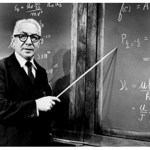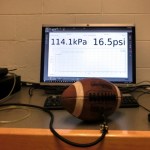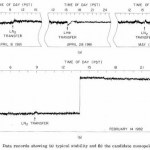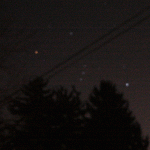
The ending of last night's Super Bowl couldn't've been more perfect as a demonstration of the point I was making about scientific thinking in football (and, you know, in that book I keep flogging...). First, on the positive side, you have New England's Malcolm Butler making the key play:
"I knew what was going to happen," said Butler, an undrafted free agent out of Western Alabama who said New England was the only team that gave him a chance to reach the NFL. "I don't know how I knew. I just knew. I just beat him to the point and caught the ball."
Perhaps Butler knew because he had seen the…
I wrote up another piece about football for the Conversation, this time drawing on material from Eureka, explaining how great football players are using scientific thinking:
Seattle Seahawks cornerback Richard Sherman gets called a lot of things. He calls himself the greatest cornerback in the NFL (and Seattle fans tend to agree). Sportswriters and some other players call him a loudmouth and a showboater. Fans of other teams call him a lot of things that shouldn’t see print (even on the internet). One thing you’re not likely to hear anyone on ESPN call Sherman, though, is “scientist.”
And…
Math with Bad Drawings has a post about "word problems" that will sound very familiar to anyone who's taught introductory physics. As he notes, the problem with "word problems" for math-phobic students is that it requires translating words into symbols, and then using the symbols to select a procedure. It adds a step to what at a lower level is a simple turn-the-crank algorithm: given this set of symbols, do these abstract operations, and write down the answers.
This is a very familiar problem in intro physics, where I regularly have struggling students tell me "I can do the math just fine, I…
Over at Curious Wavefunction, Ashutosh Jogalekar offers a list of great surprising results in physics. This is fairly comprehensive, but leaves out one of my favorites, which is the discovery of the muon. Muons are particles like electrons, but a couple hundred times heavier. When they were first detected in cosmic ray traces in 1936, physicists briefly thought they were the mesons that Hideki Yukawa had predicted as the carriers of the strong nuclear force. It quickly became clear, though, that while the mass was about right to be Yukawa's particle, the muon didn't have anything to do with…
I know I said I was done with this story, but this was actually recorded last week: The Daily Planet show on Discovery Channel in Canada contacted me last week when all this deflated-football silliness was exploding, and got a cameraman to come over and record me talking about it. The episode aired Monday night, January 26th, and you can stream it from their archives at the link above (I think it should be episode 216, but when I looked just now, it was just "Episode 16," but the date is correct. My bit is toward the end, starting around the 35:00 mark, but you should totally watch the whole…
Tonight's bedtime stories included two books involving flying characters: Foo, the Flying Frog of Washtub Pond (in which the title character gets blown into the sky by a gust of wind), and The Magic Brush. The latter is a dead-grandparent book, but ends with a cheerful picture of the kids reunited with their grandfather in their imagination, riding a flying horse. The Pip didn't pick up on the death bit, luckily for me.
"Look at them, Daddy, they're flying!"
"Yep. They're on a flying horse."
"But why are they flying?"
"Why? Well, because flying would be a lot of fun."
"I wish I could fly."
"…
While I've managed to generate a lot of blog traffic talking about football, I sort of suck at turning that into book sales. Sigh. I am, however, continuing to do interviews in support of Eureka: discovering Your Inner Scientist, the most recent of which is this one with WICN's Inquiry, hosted by Mark Lynch.
This covers a bunch of topics that haven't been talked about in other interviews, so if you're a completist, I recommend that. And if you're just here for the football talk, well, there's a bit of that, too, toward the end. I did have some trouble getting the audio to work properly in…
I've mentioned in a few places that SteelyKid frequently comes home from school/ camp/ day care singing garbled versions of current pop hits. So for the first time since about 1990, I added a Top 40 station to my car radio presets, so I would know what she was actually trying to sing. This leads to a bunch of seat-dancing and sing-along in the back seat as I drive her to taekwondo and so on, so I give you three of the songs that she's grooving two these days:
First up, we have:
My first reaction to hearing that was "Hey, it's great that Morris Day is getting work..." But, you know, I enjoyed…
The low-level cold I've been nursing for a month now finally exploded into the full unpleasantness of my usual winter illness Saturday, or else I would've been more active following up on my Deflategate article and my ideal gas law post. As it was, for most of the day, I could barely keep on top of clearing comments from moderation.
Anyway, a few things deserve more prominent responses than a comment at the end of a long post, so:
-- I was in bed during the great Bill Belichick press conference, though I saw some mockery of it come across Twitter. While it may not have played well with the…
So, as mentioned yesterday, I got an email asking me about the weird scandal involving the Patriots and underinflated footballs, so I wrote a piece for the Conversation on the subject. since a few people had beaten me to citations of the Ideal Gas Law, though, I decided to bring my own particular set of skills into this, and did an experiment.
[UPDATE: I've added some follow-up/concluding remarks in a separate post from Sunday 1/25. So, if you care about my reaction to Belichick's big press conference, go over there.]
You can see the basic set-up at the link-- I got a couple of footballs from…
One of the cool things about working at Union is that the Communications office gets media requests looking for people to comment on current events, which sometimes get forwarded to me. Yesterday was one of those days, with a request for a scientist to comment on the bizarre sports scandal surrounding the deflated footballs used in the AFC Championship game this past weekend. Which led to me doing an experiment, and writing a short article for The Conversation:
News reports say that 11 of the 12 game balls used by the New England Patriots in their AFC championship game against the…
One of my favorite Christmas presents this year was a Seek Thermal camera to use with my Android phone. This allows for a lot of idle physics-y fun, taking pictures of things in thermal mode.
One idea I had was to do a sort of follow-up to the test of my insulated mug that I did a couple of years ago with a PASCO thermocouple probe. That showed a really dramatic difference between my metal IQC water bottle and the insulated mug, in terms of the rate at which hot water placed in each cooled. So, how do these look in thermal imaging?
Well, I took my insulated mug (actually a different one than…
Having made several mentions here of the two tenure-track faculty positions we were trying to fill, I feel like I ought to at least note the completion of the search. As of last Friday, all the papers have been signed with properly dotted i's and crossed t's, and we have two new tenure-track assistant professors on board to start next fall.
It feels a little weird and possibly inappropriate to go into much detail about the folks we hired, though, given that this isn't an officially official sort of blog, and it would definitely be wrong to go into details of the process. I will say that it…
(When I launched the Advent Calendar of Science Stories series back in December, I had a few things in mind, but wasn't sure I'd get through 24 days. In the end, I had more than enough material, and in fact didn't end up using a few of my original ideas. So I'll do a few additional posts, on an occasional basis, to use up a bit more of the leftover bits from Eureka: Discovering Your Inner Scientist...)
One of the tricky things about writing this book was that I didn't just need stories from the history of science, but stories that fit a particular pattern. The point of the book, after all, is…
(That title doesn't quite scan as is, but if you stick an "a" in there, you can sing it to the tune of a song from "Fiddler on the Roof"... You're welcome.)
The last time I taught my "Brief History of Timekeeping" seminar was in 2012, so I spent a bunch of time on the Mayan calendar. This time around, we've lost the obvious pop-culture hook, but it's still so weird and fascinating that I spent a class on it last week. One of the things we talked about was what this system (what we know of it) says about the Maya concept of time. There's a very obvious contrast between the interlocking…
I'm teaching my "Brief History of Timekeeping" class again this term, and as always, I'm tweaking things a bit. This is one of our "Sophomore Research Seminar" courses, intended to introduce students to academic research, so it's not specifically a physics class, but I'm choosing to take the statements about research outside the student's field at face value, and thus will be requiring them to do final projects involving some empirical measurement of the natural world, that being the essence of scientific research. (Last time, I included that as an option, but nobody took it, so I ended up…
SteelyKid missed the bus this morning-- she was dressed and ready, but I was talking to Kate, and if there isn't a person at the end of the driveway when the bus comes around the corner, they won't stop. So I drove her over to school myself (which is faster, anyway). The GE research lab complex is behind her school, so there's a nice view from the parking lot to the eastern horizon, where the sun was just poking over a big band of clouds.
"Hey, look at that cool sunset!" she said as we were walking from the car to the building.
"That's not a sunset, honey, it's a sunrise. It's morning."
"Oh,…
"Daddy, ask me a math problem."
"OK. What's 18 plus 6?"
"Ummm... 24."
"Correct."
"See, I just keep the 18 and then add 2 from the 6 to get 20. That leaves 4 from the six, and 20 plus 4 is 24."
"Right. Good work."
------
"Hey, SteelyKid. What's 120 plus 180?"
"Ummm... 300."
"Very good!"
"I just added the hundreds to make 200, and then 80 plus 20 is 100, and then I add them all together to get 300."
"Nice work."
"It takes a little while, though."
"Yes, but you keep practicing, and getting faster."
"Practice makes perfect!"
------
"That would take ten minutes, which is... six hundred seconds."
"…
Yesterday's Open Letter to Neil deGrasse Tyson struck a chord with a lot of people, and has spread a good distance on social media, which is gratifying. Given the delocalized nature of modern social media, though, it means I'm having essentially the same argument in five different places via different platforms. In the interest of consolidating this a tiny bit, then, let me post some follow-up stuff here.
-- The most charitable interpretation of the tweet I objected to is that it's meant as praise for good students. The idea being that good students will learn in the absence of good teaching…
(When I launched the Advent Calendar of Science Stories series back in December, I had a few things in mind, but wasn't sure I'd get through 24 days. In the end, I had more than enough material, and in fact didn't end up using a few of my original ideas. So I'll do a few additional posts, on an occasional basis, to use up a bit more of the leftover bits from Eureka: Discovering Your Inner Scientist...)
Every physicist with the tiniest bit of a public profile gets letters from people with a pet theory to promote. These days, email and social media make it incredibly easy to flood the inbox of…








